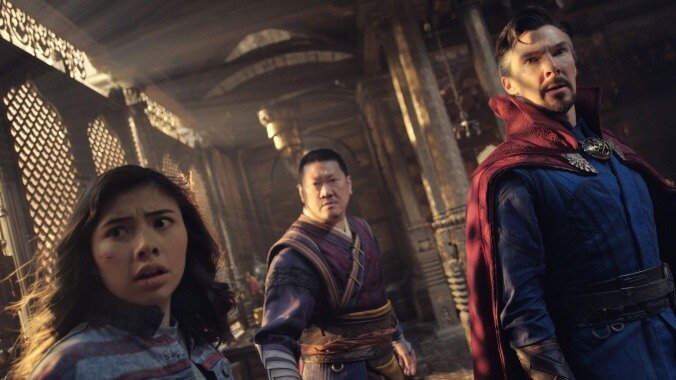Doctor Strange offers a meandering, messy multiverse
Sam Raimi's return to the superhero genre offers too many expository speeches, too little emotion, and requires way too much homework

It’s long past time for Sam Raimi to make another superhero movie, but Doctor Strange In The Multiverse Of Madness isn’t the one he should have chosen for his return. Raimi has only directed a handful of television episodes since his last feature, 2013’s Oz The Great And Powerful, but he remains a first-tier filmmaker, and a Doctor Strange sequel is a second- or third-tier challenge—especially with this story. Working from a script by Michael Waldron, whose previous MCU experience was writing and executive producing the Disney+ series Loki, Raimi has inherited a mythology of madness which requires a lot of homework (most of it involving the Disney+ series Waldron didn’t work on, WandaVision) for moviegoers to be fully up to speed, and the tale translates poorly to the big screen, even with the filmmaker working overtime to inject his raucous appetite for horror into what still needs to be a PG-13 crowd-pleaser.
As protector of a protege who’s wrestling with their powers for the second consecutive movie, Strange (Benedict Cumberbatch) settles uneasily into the mentor role previously occupied by his late know-it-all counterpart Tony Stark. After Strange’s alternate universe counterpart sends America Chavez (Xochitl Gomez) into ours, the doctor and Wong (Benedict Wong) embark on a search for a mystical book that will allow them not only to defeat America’s pursuers but also reset the roiling “multiverse” that has been disrupted. Their search leads them to Wanda Maximoff (Elizabeth Olsen), whose witchcraft complements their sorcery, but she has other plans with America, who possesses the ability to travel freely across the multiverse, although she needs help from a seasoned hand to navigate it with a modicum of control.
When Wanda decides to recreate in an alternate dimension the maternal fantasy she has manufactured, Wanda finds herself at odds with Strange, Wong, and the disciples of their spiritual practice—especially when she decides that she will do anything, including kill America, in order to achieve her goal. In the meantime, Strange flees through the multiverse, encountering different and unexpected versions of himself—and other heroes and villains—which he hopes will unlock the secrets of America’s power, and eventually, return his own universe to normal.
Given how many cinematic multiverses filmmakers have created in recent years—from the animated Spider-Verse to the one that united three Spider-Men in No Way Home—the most baffling choice Doctor Strange makes is that its exploration of this idea has nothing to do with any of them. Essentially, in the MCU timeline, No Way Home happened, and shortly thereafter a person who can travel between universes coincidentally showed up to need Strange’s help. Meanwhile, what Strange is dealing with in the post-Endgame era is determining whether or not he’s “happy”—a quandary that never gets woven into the adventure that he goes on, except for the fact that in every and all universes, his ex-girlfriend Christine (Rachel McAdams, who you’d be forgiven for forgetting was a part of the first film) wants nothing to do with him, and it’s a bummer. Around that, America and Wanda navigate their own relationship ambitions and insecurities, a thematic binding agent that gets thoroughly watered down by nonstop exposition, not to mention (and I can’t believe I’m even saying this) too many Raimi-esque flourishes.
 Keep scrolling for more great stories.
Keep scrolling for more great stories.
